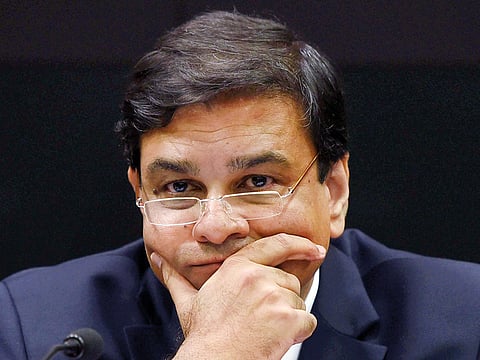RBI governor resigns following series of disputes with government
Patel’s exit expected to have major economic and political implications

Dubai: Ending several months of speculation, Reserve Bank of India (RBI) governor Urjit Patel on Monday resigned from the post citing personal reasons.
“On account of personal reasons, I have decided to step down from my current position effective immediately. It has been my privilege and honour to serve in the Reserve Bank of India in various capacities over the years,” he said in a statement.
According to media reports RBI deputy governor N.S. Vishwanathan is likely to hold fort as RBI interim head.
Patel’s resignation follows several months of friction between the RBI and the government on the autonomy of the central bank on key monetary and credit policy issues.
The RBI and government have been fighting over the central bank’s autonomy as the central government sought to reduce curbs on lending and to gain access to RBI reserves.
The friction came to the fore when RBI deputy governor Viral Acharya warned that compromising the central bank’s independence could be “catastrophic”. Following Acharya’s public warning, there was speculation in the media that the government would invoke Section 7 of the Reserve Bank of India Act of 1934.
According to the Section 7 (1) of the Act, “the central government may from time to time give such directions to the bank as it may, after consultation with the governor of the bank, consider necessary in the public interest.”
In essence, it could mean the government could dictate to central bank in matters of its functions such as monetary and credit policies.
Faced with flagging GDP growth, the government wanted the RBI to help non-banking finance companies (NBFCs) and small-to-medium-sized enterprises (SMEs) get some liquidity support, in addition to liberalising its prompt corrective action framework and undertaking other steps to push economic growth.
The dispute between the finance ministry and the RBI birthed speculation that Patel would quit on November 19 if the government insisted on utilising the central bank’s surplus capital to fund developmental expenditure.
In a move that appeared like a compromise between the government and the central bank, the RBI board at its November 19 meeting decided to set up a high-powered committee to examine issues related to surplus capital of Rs9.69 trillion (Dh498.36 billion) with the central bank. It also formed a panel to look at the issues plaguing NBFCs.
It is not clear, however what triggered Patel’s sudden resignation. Reacting to Patel’s decision finance minister Arun Jaitley tweeted: “The government acknowledges with deep sense of appreciation the services rendered by Dr Urjit Patel to this country, both in his capacity as the governor and the deputy governor of the RBI. It was a pleasure for me to deal with him and benefit from his scholarship.”
Patel took charge as the RBI governor on September 4, 2016 following his predecessor Raghuram Rajan resigned earlier that year on June 19. Patel’s term as RBI governor was to end in September 2019.
“Dr Urjit Patel is a thorough professional with impeccable integrity. He has been in the Reserve Bank of India for about 6 years as Deputy Governor and Governor. He leaves behind a great legacy. We will miss him immensely,” Prime Minister Narendra Modi said in a tweet.
Although hand-picked by the current government to succeed Rajan, Patel was not willing toe the government line on many occasions, especially when it came to the independence of the RBI.
Analysts said the timing of Patel’s resignation is crucial. It comes four days ahead of the RBI’s scheduled board meeting on December 14, slated to discuss several contentious issues.
However, at this point it is not clear if the government was going ahead with its plans to dip into RBI’s surplus or even invoke Section 7 (1) of the RBI Act.
The exit of key officials such as Patel and former chief economic adviser Arvind Subramanian points to the fact that all is not well with the management of the Indian economy.
Subramanian on Sunday warned that the Indian economy was in for a slowdown for some time as both the agriculture and financial systems were under stress.
Speaking at the release of his book, ‘Of Counsel: The Challenges of the Modi-Jaitley Economy’, he said both demonetisation and the implementation of the Good and Services Tax (GST) had resulted in the moderation of the economy, adding that the budget estimate of revenue collection from GST seemed to be unreasonable.
With the key state election results expected on Tuesday and visible signs of cracks in the ruling NDA coalition in recent months, the departure of top officials is likely to add to the woes of the government in the months leading to India’s general election.
Rupee and stocks likely to face pressure
Dubai: The Indian rupee and stocks are expected to be volatile on Tuesday reflecting the fallout of the Reserve Bank of India (RBI) governor Urjit Patel’s sudden resignation and the election results expected from four key states.
If the verdict in state elections is not in favour of the ruling NDA alliance, markets and the currency are expected to tank further. The rupee depreciated 59 paise to 71.40 against the US dollar in early trade on Monday at the interbank foreign exchange.
Forex traders said besides increased demand of the US currency from importers, the dollar’s strength against some currencies overseas weighed on the rupee.
The rupee opened lower at 71.28 against the dollar and dropped further to 71.41, 59 paise down over its previous close. The 30-share BSE Sensex plummeted 551.74 points, or 1.55 per cent, to 35,121.51 in opening session. In similar movement, the NSE Nifty slumped 172.95 points, or 1.62 per cent, to 10,520.75.
Sign up for the Daily Briefing
Get the latest news and updates straight to your inbox



